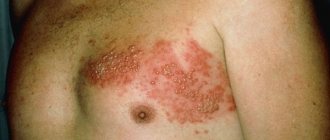What is it and how often does it happen
An intestinal infection is a disease that develops when viruses or bacteria enter the body and is manifested by diarrhea, vomiting, fever, weakness and dehydration.
According to WHO data for 2021, rotavirus infection accounted for 60% of cases of severe diarrhea in children under 5 years of age, and most of them were under one year of age. When the first symptoms appear in young children, it is necessary to seek medical help - up to 200 thousand children still die from rotavirus infection every year in the world, especially in developing countries.
The following tests are required
To accurately identify the causes of ailments, it is necessary to undergo some tests and studies.
This is necessary in order to identify possible problems in the functioning of the large intestine at an early stage. Biochemical blood test Ultrasound of the abdominal organs Gastroscopy (EGD)
Considering the increase in cancer diseases in recent years, in particular colon cancer, people over 45 years of age and earlier, if there are complaints, in our clinic you can undergo a Colonoscopy (including during sleep)
How and when can you become infected?
Sources of rotavirus infection can be a sick child or an asymptomatic carrier. The virus is excreted from the body in the stool and gets onto household items, clothing and food with dirty hands.
Doctors often call rotavirus infection a “dirty hands” disease.
A healthy child can introduce the virus into the body first by touching things, and then by touching the face, and also by eating unwashed vegetables and fruits.
Rotavirus outbreaks typically occur in winter, early spring, or late fall because viruses persist in the environment longer at low temperatures. In summer, food poisoning occurs more often - the cause is usually bacterial contamination of food, and bacteria multiply better in the hot season.
Diagnostics
To isolate rotavirus and its serotype, bacteriological, microscopic, serological examination of feces, vomit and blood serum is prescribed. The diagnosis is confirmed by the presence of viral particles in the biomaterial being studied.
A general urine and blood test and coprogram are of auxiliary importance in diagnosing the disease. In doubtful cases, sigmoidoscopy (endoscopic examination of the rectum and sigmoid colon) and biopsy of the colon mucosa are prescribed. To obtain information about changes in the ENT organs, rhinoscopy, otoscopy, and pharyngoscopy are used.
During diagnosis, it is necessary to exclude diseases with similar symptoms:
- dysentery (acute intestinal infection caused by bacteria of the genus Shigella),
- salmonellosis (damage to the digestive system by bacteria of the genus Salmonella),
- cholera (intestinal damage by Vibrio cholerae),
- food poisoning,
- enteroviruses of other etiologies,
- coli infection (damage to the gastrointestinal tract with E. coli),
- Giardiasis (caused by intestinal lamblia).
What happens when a virus enters the body
With food or saliva - if a child licks his dirty hands - rotavirus enters the mouth, then into the stomach and intestines. There it penetrates the cells of the superficial layer lining the intestines from the inside and damages them. Unlike bacteria, viruses do not lead to significant inflammation of cells; they disrupt the functioning of the body's enzyme systems to a greater extent.
Carbohydrates stop being broken down and accumulate in the intestines - the balance of fluid, potassium and sodium in the body is disrupted. A lot of water, electrolytes, organic acids and carbon dioxide collect in the intestine, which normally should not be there. Because of them, vomiting and diarrhea begin and gas formation increases. At the age of up to 5 years, intestinal cells are not yet mature enough - rotavirus affects up to 2/3 of them, so children get sick more often and more severely than adults.
Most often, the first symptom is vomiting. It occurs simultaneously with or precedes diarrhea and usually lasts 1-2 days. The stool is usually watery, foamy, yellow in color with a small amount of mucus. In infants it can occur up to 20 times a day. The duration of diarrhea is on average 3-7 days, but there are cases of up to two weeks - usually in children under one year old. Sometimes the infection begins with a fever of up to 38-39 ° C, symptoms of ARVI - cough, runny nose, sore throat. Children can also refuse to eat and literally collapse.
Causes of diarrhea
- bacterial and viral infections (acute intestinal infections - AII), parasitic infestations. Acute respiratory infections are second only to acute respiratory infections (ARVI) in prevalence;
- enzyme deficiency: absolute - occurs, for example, with diseases of the pancreas, intolerance to milk sugar - lactose, and relative - with an excess of indigestible foods in the diet (food rich in plant fiber and fats), overeating;
- chronic diseases of the gastrointestinal tract (chronic colitis, enteritis, Crohn's disease, etc.) - when its mucous membrane is damaged, the absorption of nutrients is impaired;
- violations of the quantitative and qualitative composition of the intestinal microflora (dysbacteriosis);
- surgical pathology (appendicitis, polyps, intestinal tumors);
- nervous overstrain, emotional stress (“bear disease”);
- vitamin deficiency (deficiency of vitamin B2, niacin, etc.);
- side effects of certain medications (sorbitol, magnesium preparations, antacids, some antihypertensive drugs, antibiotics, antidepressants, non-steroidal anti-inflammatory drugs, etc.), overdose of laxatives.
It is difficult to find a person who has never suffered from diarrhea in his life - such a problem happens to each of us more than once. Perhaps that is why they often treat it lightly, letting things take their course and not seeking medical help in a timely manner. Meanwhile, “banal diarrhea” can be a manifestation of very serious, sometimes life-threatening diseases. If diarrhea develops, you need to remember the main alarming symptoms that require immediate medical attention:
- the appearance of mucus and blood in the stool;
- stool has a tar-like color and consistency (sometimes accompanied by vomit that resembles coffee grounds);
- passing copious watery stools more often than 15-20 times a day;
- copious light-colored stools against the background of a drop in body temperature below normal;
- combination of diarrhea and high fever;
- a combination of diarrhea, abdominal pain and severe vomiting;
- diarrhea lasts more than three days, despite prescribed treatment;
- diarrhea is accompanied by disturbances of consciousness;
- diarrhea for more than 2 days in an elderly person or a child under one year old;
- diarrhea appears periodically for no apparent reason, accompanied by weight loss and weakness.
If you have detected at least one of the listed symptoms, there is no need to hesitate. But this does not mean that in other cases seeking medical help is not necessary. Particularly serious consequences of diarrhea
may occur in old age and childhood, due to the particularly rapid onset of dehydration.
Diarrhea has a variety of not only causes, but also manifestations. First of all, this concerns the appearance of excreted feces: their consistency, color, visible impurities. This is very important for diagnosis. Let's look at the most common options.
What to do to avoid getting sick
Frequent and thorough hand washing with soap is the prevention of any viral and bacterial infections.
- You need to teach your child to do this from an early age: after going outside and going to the toilet, before meals, and just several times a day.
- Parents should wash their hands themselves before touching or feeding the baby.
- It is important to wash vegetables and fruits before eating, observe temperature conditions when preparing food, and drink boiled or bottled water.
The largest amount of virus is excreted in the stool in the first 5 days of illness, so during this period you need to wash your hands more often and wet clean your home.
Vaccination against rotavirus
There are two vaccines - the Belgian Rotarix and the Russian RotaTek. Only RotaTek is registered in the Russian Federation. It contains the 5 most common strains. Vaccination against rotavirus infection is not included in the national vaccination schedule, but it can be done at the request of parents. RotaTek has strict age restrictions and intervals between revaccinations - be sure to consult your pediatrician.
“The effectiveness and safety of vaccines against rotavirus infection, subject to age limits, has been confirmed in many studies,” says Elena Kolganova, a pediatrician at the Fantasy children’s clinic. — After receiving the third dose of the vaccine, the number of hospitalizations decreased by 100%, and visits to the clinic decreased by 96%. Rotavirus, unlike influenza, rarely mutates, and therefore vaccination does not need to be carried out every year - immunity lasts up to three years.”
How to help your child
Pediatrician and infectious disease specialist at the GMS clinic Daria Zakharova reminds that the infection in different children can occur in different ways: for some - in the form of mild malaise, decreased appetite with minor abdominal discomfort and a single loose stool, for others - with fever, repeated vomiting and severe diarrhea.
“The parents’ actions largely depend on the severity and age: where to turn for help. If a child feels sick every hour and complains of severe abdominal pain, then you need to call an ambulance, which will take him to the hospital, where the cause of the pain will be determined. In all other cases, you need to call a doctor,” emphasizes Daria Zakharova.
In children over five years of age, the infection is usually milder, so you can help them on your own.
“You need to start with drinking plenty of fluids to replenish the fluid deficit - what the child loses with vomiting and diarrhea,” says Elena Kolganova. There are special formulas for calculation, but usually 50-100 ml of water per kg of body weight per day is required, i.e. if a child weighs 30 kg, then with rotavirus infection he will need from 1.5 to 3 liters of liquid per day. It is better to use a special pharmaceutical solution: for children it should contain a minimum of salt and sugar. You need to give your child water often and little by little - 10-15 times an hour, 2-3 sips.”
First aid for poisoning
For severe poisoning, or poisoning that occurs after eating mushrooms or canned food, you need to call an ambulance.
Symptoms that require medical attention:
- very high temperature;
- frequent diarrhea, watery stools, blood;
- signs of botulism and poisoning from poisonous mushrooms - impaired vision and coordination, difficulty swallowing, hallucinations, delirium and muscle weakness;
- a small child, a pregnant woman or an elderly person was injured.
What to do in case of poisoning:
- Gastric lavage. Give the patient water or a solution of soda, salt, potassium permanganate, and then induce vomiting. You should drink no more than half a liter of liquid at a time. Washing should be continued until there are no impurities in the vomit. Typically this requires approximately five liters of liquid;
- Taking enterosorbent - a drug that binds and removes toxins. This can be activated carbon, polysorb, filtrum or enterosgel;
- Eliminate dehydration and restore electrolyte balance. To achieve this goal, you need to drink plenty of fluids (weak tea and water at room temperature) and use special solutions (rehydron and glucosolan).
In most cases, relief occurs on the second day, and all signs disappear within three to five days. Otherwise, a therapist or gastroenterologist will be able to figure out the problem.
What are the dangers of rotavirus without treatment?
Diarrhea and vomiting cause the body to lose a lot of water along with sodium, potassium, magnesium and other electrolytes. This leads to disruption of the lungs - the child begins to breathe frequently and shallowly; the heart and blood vessels - the heart rate increases, blood pressure decreases; and the brain - dizziness, headache, and weakness appear.
In infants, rotavirus infection is most dangerous because convulsions or loss of consciousness can occur as a result of the loss of large amounts of fluid and electrolytes. It is very important to immediately call an ambulance at the first signs of an intestinal infection in infants.
How to help the body recover
“Previously, there was an opinion that if you have a rotavirus infection, you should not consume dairy products,” says Elena Kolganova. — Now scientists have revised their opinion on this matter: if a child is breastfed or formula-fed, then nothing needs to be changed. For adult children, it is advisable to remove fresh fruits and vegetables, as they enhance peristalsis and fermentation processes in the intestines.”
If a child has a temperature above 38.5 ºС, you can give him antipyretics, and in case of severe pain - antispasmodics. You should not give painkillers - this will mask the symptoms and it will be difficult for the doctor to make a diagnosis. You should not rinse your child’s stomach - this will increase vomiting and lead to extreme dehydration - loss of consciousness, convulsions.
“Treatment of uncomplicated rotavirus infection is symptomatic: the main thing is to drink plenty of fluids. Vomiting and loose stools usually go away on their own. However, taking probiotics can speed up the recovery process; their administration is safe and quite effective,” says Daria Zakharova.
It is always easier to prevent a disease than to treat it - observe the rules of personal hygiene and teach your children to do the same, wash fruits and vegetables and do not drink tap water.
Black diarrhea
The most serious reason that can cause black loose stools is esophageal, gastric or intestinal bleeding (for example, varicose veins of the esophagus, gastric or duodenal ulcers, tumors). When blood comes into contact with digestive enzymes, it turns black. Tar-like stool indicates fairly heavy bleeding. If it is localized in the stomach, sometimes coffee-ground vomiting occurs. Critical blood loss can occur quite quickly - the patient must be taken to a surgical hospital as soon as possible. Sometimes blackening of the stool is caused by taking certain medications (activated carbon, iron, bismuth, vitamin-mineral complexes).










